Private 5G and network slicing set to drive enterprise adoption of 5G
In a wide-ranging conversation with RCR Wireless News, Verizon Business Chief Revenue Officer for Global Enterprise and Public Sector Massimo Peselli shared his outlook for 2024. With a growing private 5G business and ongoing work on network slicing, Peselli said enterprises, including small- to medium-sized businesses, are increasingly interested in using 5G to understand “how this can help their business.”
Verizon started moving commercial traffic to its 5G Standalone network in late 2022; the standalone mode of operation is a prerequisite for network slicing which is all about creating cross-domain virtual partitions of a network that are tuned to the specific quality of service needs of a specific business, use case or application. In November last year, the company demonstrated 5G network slicing for a public safety wherein mission critical video and data traffic traversed a dedicated slice of the public network.
Being able to sustain specific performance characteristics is “the beauty of network slicing,” Peselli said. And this ability to carve out a portion of the public network could help drive adoption of 5G in small- and medium-sized businesses. He also called out the complementarities between Verizon’s 5G-backed fixed wireless access broadband service and network slicing; that combo would let the operator “make sure that we bring the connectivity and we guarantee the level of performance…that is required.”
“I think if you look at small locations, and you think of digitalizing those sites, a combination of cloud, edge and network is where we’ll be going.” SMBs, he said, want hardware-less sites. “I think 5G with network slicing can deliver the promise of the quality of service at an an affordable level.”
In terms of more bespoke private 5G deployments, Peselli said the line of business is growing and he thinks it will be “substantial” in the 2025-2026 timeframe. Based on conversations with potential customers for private 5G, he called out security as “pivotal” and a big thrust of the sales pitch.
“I’ve seen a transition over the last 12 months,” he said. “When we talk initially on private 5G…the most common initial use case people had in mind was to use CBRS.” That interest in leveraging shared access to unlicensed spectrum has given way to more interest in leveraging Verizon’s licensed, dedicated spectrum for 5G. Peselli said his private 5G sales funnel a year ago was around 70% CBRS-related. Now, 80% of funnel activity is around licensed spectrum. “We’ve seen that transition which is kind of paired to an increasing level of attention to security.”
Peselli called out private 5G traction in heavy industrial facilities like ports and factories as well as in the healthcare vertical. “Those industrial hubs…are still definitely an area that will grow. Specific to healthcare, there’s traction around internal communications, patient monitoring and asset tracking, he said. Cutting across verticals, Peselli said AR/VR-based training will be necessary to address global labor dynamics and projected skill shortfalls.
“We see this convergence of opportunities,” covering everything from network, cloud and edge to workforce, business efficiency and improved customer experience, Peselli said. “It’s like all of these opportunities are coming together and reinforcing the case for technology, for digital transformation, and all of that is sustained by networks.”
And it wouldn’t be a “look ahead” conversation without touching on how Verizon sees artificial intelligence fitting into all of this. “The value for AI is really the ability to process an enormous amount of data and create insights that need to be actioned in near-real time. So speed is the real advantage of AI, and when we talk about we speed, we go back to the network.”

